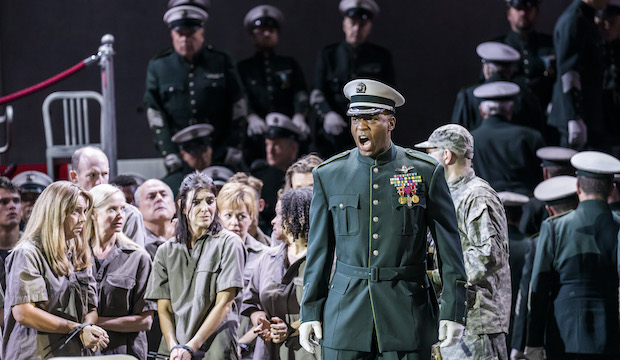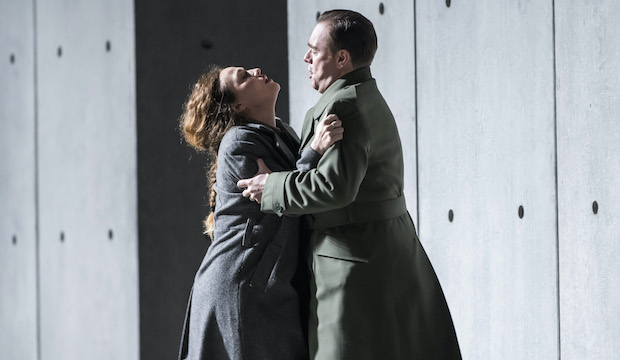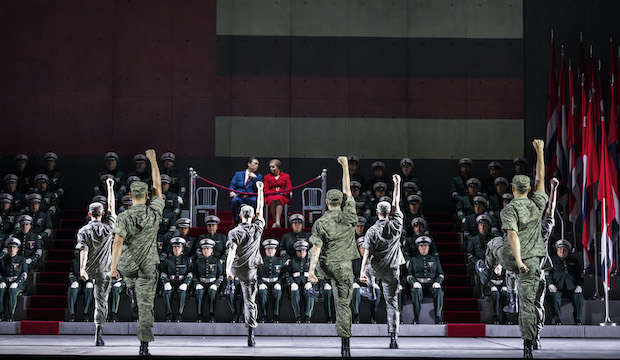Aida review ★★★★★, Royal Opera House
Robert Carsen's prescient new production of Verdi's opera finds parallels in today's headlines
Aida (Elena Stikhina) and her rival in love Amneris (Agnieszka Rehlis) in Verdi's opera at Covent Garden. Photo: Tristram Kenton
With its glamorous Egyptian setting, complete with exotic animals in some spectacular productions, Verdi’s Aida has become a defining grand opera.
But just listen to the first few bars of that overture. Where he might have opened with the sort of military pomp that comes later, Verdi spins a single gossamer line. Lives hang by a thread in this opera. A whisper, overheard, and not a shout, can change everything when love and duty collide.
The enemy nations in Robert Carsen’s new production of Aida for the Royal Opera House – the first new production of the packed 2022/23 season – are not recognisably ancient Egypt and Ethiopia. Rather, they are a modern-day military dictatorship and oppressed neighbour. Years in the making, the production predates the Russian invasion of Ukraine, but parallels are painfully clear.
Love across the divide comes in the form of an illicit relationship between an Egyptian officer, Radames, and the daughter of his enemy’s leader, the Aida of the title. Radames is also pursued by his ruler’s daughter, whose hand he is offered in exchange for good service.

Soloman Howard as Ramfis makes an impressive Covent Garden debut. Photo: Tristram Kenton
In a wonderful night for male voices, Korean bass In Sung Sim is a 21st-century pharaoh, an idolised figurehead, served by a vast army, meticulously drilled. French baritone Ludovic Tézier as Amonasro leads his vanquished people with rage and passion. But it is American bass Soloman Howard as Ramfis -– originally a high priest, here a General – who, in a Covent Garden debut to remember, drew the loudest cheers from a delighted first night audience.
It is not only Howard’s rich, expressive voice that makes him such an impressive singer, but his charismatic stage presence. You can truly believe that his orders would be followed by all he commands. Would that the same could be said of Italian tenor Francesco Meli as Radames. This newly promoted officer is supposedly the best man to lead an offensive and the object of two rival women’s love, but less than compelling vocally and with little presence, this Radames was disappointingly dull.
Aida and Amneris, on the other hand, have a really interesting relationship, rivals who are almost sympathetic towards each other. The remarkable Polish mezzo-soprano Agnieszka Rehlis, also making her house debut, is the imperious Amneris, her voice smouldering with deep desire as she struts in Megan-style caped dresses.

Aida (Elena Stikhina) and Radames (Francesco Meli) risk all for love. Photo: Tristram Kenton
In her drab beige pinafore, by contrast, it is through the gleaming soprano voice of Russia soprano Elena Stikhina that Aida shines. Her musical phrasing and utmost control is all the colour she needs to make a big impression.
Miriam Buether's set and Annemarie Woods’ costume designs emphasise the drab uniformity of a totalitarian state. Infatuation with the national flag is ever the hallmark of the shallow or insecure. Here, only the ubiquitous blue, red and white of the warmongers, plus their military regalia, punctuate shades of grey.
In a shocking coup de théâtre at the end of Act II, video designed by Duncan McLean shows escalating violence from real-life conflicts exploding in time to Verdi’s music, like a macabre fireworks display. The surprisingly unfocused final scene lacks such drama.
It is 20 years since Sir Antonio Pappano was first named music director of the Royal Opera House, then the youngest person to have held this post. Two decades later, audiences know that in the Italian repertoire in particular the orchestra and chorus of the Royal Opera are in hands not only expert but thoughtful, passionate and kind.

Even the dance is militaristic in Robert Carsen's meticulously staged Aida. Photo: Tristram Kenton
In this, his penultimate annual season at Covent Garden before moving to the London Symphony Orchestra, it is tempting to reach out and beg him to stay. Drawing stirring ensemble playing and intimate solos from the orchestra, he is also superbly served by the strong and immaculate chorus, always on parade or on manoeuvres and rejoicing in violence, even as interpreted in dance by choreographer Rebecca Howell.
And three cheers for soprano Francesca Chiejina, never visible but singing off-stage with clarity and mystery as the High Priestess. Hear her again when the Royal Ballet dances the new Crystal Pite full-length work in October and November, to Gorecki’s Symphony No 3.
Aida is sung in Italian with English surtitles. Remaining autumn performances are on 28, 30 Sept; 3, 6, 9 and 12 Oct. Booking opens for May and June performances on 2 Jan.Click here for all booking information. Aida is screened live in cinemas throughout London and nationwide, Wed12 Oct. An encore screening is on Sun 16 Oct. Click here for screening details
But just listen to the first few bars of that overture. Where he might have opened with the sort of military pomp that comes later, Verdi spins a single gossamer line. Lives hang by a thread in this opera. A whisper, overheard, and not a shout, can change everything when love and duty collide.
The enemy nations in Robert Carsen’s new production of Aida for the Royal Opera House – the first new production of the packed 2022/23 season – are not recognisably ancient Egypt and Ethiopia. Rather, they are a modern-day military dictatorship and oppressed neighbour. Years in the making, the production predates the Russian invasion of Ukraine, but parallels are painfully clear.
Love across the divide comes in the form of an illicit relationship between an Egyptian officer, Radames, and the daughter of his enemy’s leader, the Aida of the title. Radames is also pursued by his ruler’s daughter, whose hand he is offered in exchange for good service.

Soloman Howard as Ramfis makes an impressive Covent Garden debut. Photo: Tristram Kenton
In a wonderful night for male voices, Korean bass In Sung Sim is a 21st-century pharaoh, an idolised figurehead, served by a vast army, meticulously drilled. French baritone Ludovic Tézier as Amonasro leads his vanquished people with rage and passion. But it is American bass Soloman Howard as Ramfis -– originally a high priest, here a General – who, in a Covent Garden debut to remember, drew the loudest cheers from a delighted first night audience.
It is not only Howard’s rich, expressive voice that makes him such an impressive singer, but his charismatic stage presence. You can truly believe that his orders would be followed by all he commands. Would that the same could be said of Italian tenor Francesco Meli as Radames. This newly promoted officer is supposedly the best man to lead an offensive and the object of two rival women’s love, but less than compelling vocally and with little presence, this Radames was disappointingly dull.
Aida and Amneris, on the other hand, have a really interesting relationship, rivals who are almost sympathetic towards each other. The remarkable Polish mezzo-soprano Agnieszka Rehlis, also making her house debut, is the imperious Amneris, her voice smouldering with deep desire as she struts in Megan-style caped dresses.

Aida (Elena Stikhina) and Radames (Francesco Meli) risk all for love. Photo: Tristram Kenton
In her drab beige pinafore, by contrast, it is through the gleaming soprano voice of Russia soprano Elena Stikhina that Aida shines. Her musical phrasing and utmost control is all the colour she needs to make a big impression.
Miriam Buether's set and Annemarie Woods’ costume designs emphasise the drab uniformity of a totalitarian state. Infatuation with the national flag is ever the hallmark of the shallow or insecure. Here, only the ubiquitous blue, red and white of the warmongers, plus their military regalia, punctuate shades of grey.
In a shocking coup de théâtre at the end of Act II, video designed by Duncan McLean shows escalating violence from real-life conflicts exploding in time to Verdi’s music, like a macabre fireworks display. The surprisingly unfocused final scene lacks such drama.
It is 20 years since Sir Antonio Pappano was first named music director of the Royal Opera House, then the youngest person to have held this post. Two decades later, audiences know that in the Italian repertoire in particular the orchestra and chorus of the Royal Opera are in hands not only expert but thoughtful, passionate and kind.

Even the dance is militaristic in Robert Carsen's meticulously staged Aida. Photo: Tristram Kenton
In this, his penultimate annual season at Covent Garden before moving to the London Symphony Orchestra, it is tempting to reach out and beg him to stay. Drawing stirring ensemble playing and intimate solos from the orchestra, he is also superbly served by the strong and immaculate chorus, always on parade or on manoeuvres and rejoicing in violence, even as interpreted in dance by choreographer Rebecca Howell.
And three cheers for soprano Francesca Chiejina, never visible but singing off-stage with clarity and mystery as the High Priestess. Hear her again when the Royal Ballet dances the new Crystal Pite full-length work in October and November, to Gorecki’s Symphony No 3.
Aida is sung in Italian with English surtitles. Remaining autumn performances are on 28, 30 Sept; 3, 6, 9 and 12 Oct. Booking opens for May and June performances on 2 Jan.Click here for all booking information. Aida is screened live in cinemas throughout London and nationwide, Wed12 Oct. An encore screening is on Sun 16 Oct. Click here for screening details
TRY CULTURE WHISPER
Receive free tickets & insider tips to unlock the best of London — direct to your inbox
| What | Aida review , Royal Opera House |
| Where | Royal Opera House, Bow Street, Covent Garden, London, WC2E 9DD | MAP |
| Nearest tube | Covent Garden (underground) |
| When |
25 Sep 22 – 01 Jun 23, Seven performances 25 Sept to 12 Oct; nine performances 25 May to 1 June. Start times vary. Running time c 3hr |
| Price | £12-£280 |
| Website | Click here for more information and booking |